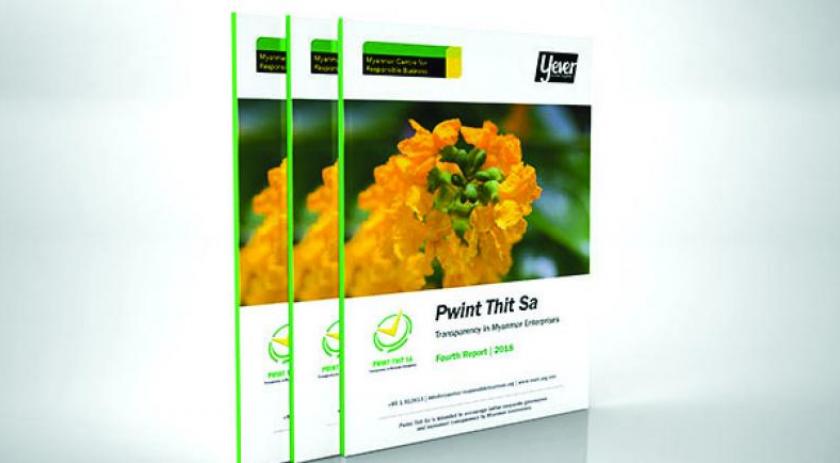
Almost twice as many companies were assessed as in the last Pwint Thit Sa report, published in 2016, using twice as many dimensions and criteria. This makes Pwint Thit Sa 2018 the most ambitious public report ever published about the state of corporate governance in Myanmar.
The 2018 report, although based on the same principle of rating online information disclosure by companies, adopts a different scorecard from the previous three reports. The scoring is now based on the ASEAN Corporate Governance Scorecard which is being used in Malaysia, Thailand, Philippines, Indonesia and Singapore.
The top three companies in 2018 scoring highest for disclosure are First Myanmar Investment (FMI) Group, City Mart Holdings (CMHL), and Serge Pun & Associates (SPA). While these companies have consistently featured in the Top 10 of previous Pwint Thit Sa reports, all of them have made added efforts in Pwint Thit Sa 2018 to enhance disclosure, and CMHL has risen from 8th in 2016 to 2nd in 2018.
Other companies scoring highly are Aya Bank and Max Myanmar, Shwe Taung and Grand Guardian Insurance, Dagon Group and Myanmar Thilawa SEZ Holdings. Myanmar Awba, Myanmar Citizens Bank, and First Private Bank have all significantly improved disclosure of corporate governance information compared to their disclosure in the last report in 2016.
Many companies of those assessed still do not have corporate websites (67 out of 182, or 37% of those surveyed). Even where companies do, many of these websites publish little to no data relating to the criteria covered in this survey. Of those companies with websites, 80 out of 116 (69%) scored less than 7%, which was the overall average score for all companies assessed.
Launching the report, Vicky Bowman, Director of Myanmar Centre for Responsible Business, and an Interim Board member of the newly launched Myanmar Institute of Directors said:
“This year’s Pwint Thit Sa report is a step change, with more companies, more wide ranging criteria, and based for the first time on the ASEAN Corporate Governance Scorecard. Yet much is familiar: the leading companies from last year are still more or less the same as before. FMI should be congratulated for coming top for the third year running and demonstrating a high standard of corporate governance. And companies like CMHL, Shwe Taung and AYA Bank should be recognised for their significant improvement.”
“One striking statistic from this year’s report is that the average score for a company in which the World Bank’s International Finance Corporation invests is 54%, compared to an average of companies assessed of 7%. This is even greater transparency than the five listed companies on Yangon Stock Exchange, which averaged 38%. This demonstrates that good corporate governance is what attracts investors and partners for companies. It also shows that IFC investment and the guidance that accompanies it, make a real difference to how these companies run themselves”.
Nicolas Delange, of business sustainability consultancy Yever, MCRB’s partner for the report, remarked:
“The enthusiasm with which some companies took up our offer of feedback, and the dramatic improvement in their scores that resulted, clearly demonstrates that some companies are keen to receive guidance on what good corporate governance and disclosure means. The Securities and Exchange Commission of Myanmar is well-placed to do this, and to set corporate governance in Myanmar off on the right track. But it needs to have sufficient resources and support from development partners to do so”.
“What is also good to see is that there is innovation and global best practice on the part of some of the leading companies when it comes to sustainability management and reporting. This takes us away from the donations culture towards a future in which sustainability and inclusion are embedded in the business’ core activity”.
Another striking finding was the very poor disclosure record and absence of corporate governance by companies who are registered at DICA as ‘public’ companies, but have not met the reporting and disclosure requirements for such companies which were introduced in the 2015 Securities Exchange Rules. The average score for such companies was 4%.
Large and medium sized companies who have not been included in the 182 companies surveyed in this report but who are interested in demonstrating their commitment to transparency can volunteer throughout 2018 to be benchmarked under MCRB’s ‘Mini Pwint Thit Sa’ process.
Recommendations are included in the report which are intended to enhance corporate governance and transparency. These are directed at Myanmar companies, government, the Anti-Corruption Commission, the Myanmar Parliament, institutional investors and civil society and the media.












